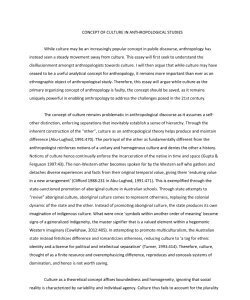CONCEPT OF CULTURE IN ANTHROPOLOGICAL STUDIES While culture may be an increasingly popular concept in public discourse, anthropology has instead seen a steady movement away from culture. This essay wi
CONCEPT OF CULTURE IN ANTHROPOLOGICAL STUDIES While culture may be an increasingly popular concept in public discourse, anthropology has instead seen a steady movement away from culture. This essay wi
CONCEPT OF CULTURE IN ANTHROPOLOGICAL STUDIES
While culture may be an increasingly popular concept in public discourse, anthropology has instead seen a steady movement away from culture. This essay will first seek to understand the disillusionment amongst anthropologists towards culture. I will then argue that while culture may have ceased to be a useful analytical concept for anthropology, it remains more important than ever as an ethnographic object of anthropological study. Therefore, this essay will argue while culture as the primary organizing concept of anthropology is faulty, the concept should be saved, as it remains uniquely powerful in enabling anthropology to address the challenges posed in the 21st century.
The concept of culture remains problematic in anthropological discourse as it assumes a self-other distinction, enforcing separations that inevitably establish a sense of hierarchy. Through the inherent construction of the “other”, culture as an anthropological theory helps produce and maintain difference (Abu-Lughod, 1991:470). The portrayal of the other as fundamentally different from the anthropologist reinforces notions of a unitary and homogenous culture and denies the other a history. Notions of culture hence continually enforce the incarceration of the native in time and space (Gupta & Ferguson 1997:43). The non-Western other becomes spoken for by the Western self who gathers and detaches diverse experiences and facts from their original temporal value, giving them ‘enduring value in a new arrangement’ (Clifford 1988:231 in Abu-Lughod, 1991:471). This is exemplified through the state-sanctioned promotion of aboriginal culture in Australian schools. Through state attempts to “revive” aboriginal culture, aboriginal culture comes to represent otherness, replaying the colonial dynamic of the state and the other. Instead of promoting aboriginal culture, the state produces its own imagination of indigenous culture. What were once ‘symbols within another order of meaning’ become signs of a generalized Indigeneity, the master signifier that is a valued element within a hegemonic Western imaginary (Cowlishaw, 2012:405). In attempting to promote multiculturalism, the Australian state instead fetishizes difference and romanticizes otherness, reducing culture to ‘a tag for ethnic identity and a license for political and intellectual separatism’ (Turner, 1993:414). Therefo
